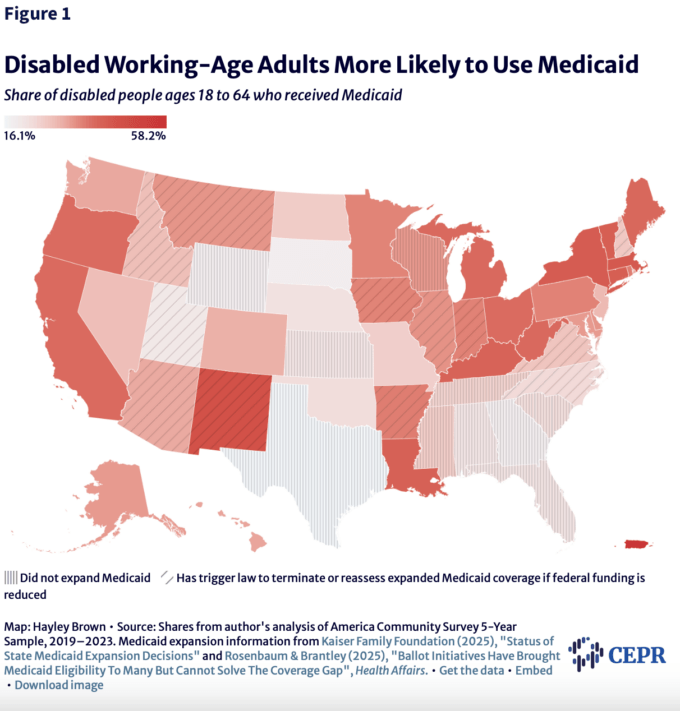On July 4, President Trump signed into law a sweeping GOP budget reconciliation package, which he and the GOP proudly dubbed their “one big beautiful bill.” The law is anything but pretty, however, for the millions of Americans with disabilities who stand to lose medical insurance coverage. The legislation imposes deep cuts to Medicaid and new work requirements — changes that threaten to strip essential medical care from the very people who need it most.
Medicaid plays an outsized role in serving the disabled population. Over 41 percent of working-age (those ages 18 to 64) US adults with disabilities rely on Medicaid for their health coverage, compared to just 13.2 percent of those without disabilities. The share of disabled working-age adults enrolled in Medicaid is even higher in some parts of the country (Figure 1); 58.2 percent of working-age disabled adults in Puerto Rico rely on Medicaid, as do 46.3 percent in New Mexico and 43.8 percent in Massachusetts.

Disabled people are disproportionately represented among those who use Medicaid. Among working-age adults, 28 percent of Medicaid enrollees report at least one type of disability, compared to just 7.7 percent of those who do not use Medicaid. The trend is also not confined to states that declined to expand Medicaid under the Affordable Care Act (Figure 2). Disabled people who benefited from such Medicaid expansions face additional uncertainty in the wake of the cuts to federal funding. Several states that expanded coverage have so-called “trigger laws,” which require them to revisit or terminate their expansions if federal support falls below certain thresholds. If that happens, thousands of disabled adults in those states could lose coverage almost overnight, with no clear alternatives.

These figures reflect persistent barriers to participation for disabled people. Full-time employment, and therefore employer-sponsored insurance, is often out of reach for disabled adults. Navigating alternative programs like Supplemental Security Income (SSI) or Social Security Disability Insurance (SSDI) can take years of appeals and paperwork, requiring both money and expertise. Even among disabled Medicaid enrollees, only about 35 percent also receive SSI, and many don’t have another formal recognition of their disability. Medicaid remains one of the only dependable ways that disabled people can access the medical care and equipment they need to survive.
The new law reflects no such consideration, however, instead imposing punitive work requirements on Medicaid recipients with only limited (and complicated) exceptions for disabled people. These exceptions are structured so that many people who desperately need help will find it impossible to qualify. They risk cutting off coverage for many who don’t qualify for SSI or SSDI but still face significant limitations on their ability to work. Stringent work requirements also ignore the systemic challenges disabled Americans face, from inaccessible workplaces to employers failing to provide sufficient accommodations. Denying people health care does nothing to address these barriers — it only makes participation in work and community life even harder. Denying people health care does save money, however — money that the folks behind this bill are eager to redistribute to their wealthy patrons in the form of lucrative tax cuts.
Rather than erecting new barriers to care, the US should be moving closer to a system that treats health care as a right, rather than privilege. This bill proceeds in exactly the opposite direction. And its devastating effects will be borne disproportionately by disabled people, whom it treats as disposable.
This first appeared on CEPR.
The post One Big Ugly Death Sentence for Disabled People appeared first on CounterPunch.org.
This post was originally published on CounterPunch.org.